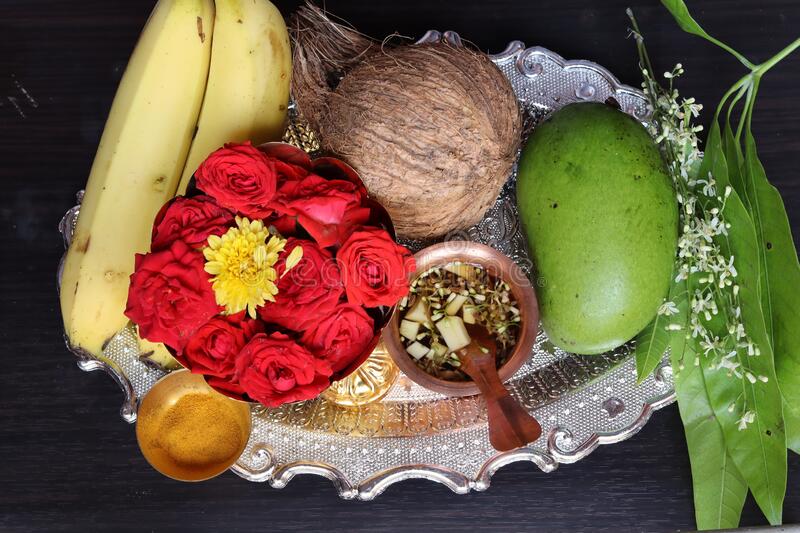
Tomorrow is Ugādi — the first day of Chaitrā māsā, or the beginning of the new year. Largely celebrated in South India (where I am from), Maharashtra (as Gudi Padwa), Sindh (as Cheti Chand), and Manipur (as Sajibu Nongma Pānba). It is also the start of Navaratri.
Unlike New Year’s day as per the Gregorian calendar, the start of a new year in Indian calendars is largely marked by ritualistic celebration — early morning bath, followed by prayers and visit to the nearby temple. Celebration is characterised by new clothes, sweets and social gathering.
Ugādi is a derivative of yuga-ādi, which means the dawn of a new age. So, in a way, the festival celebrates new beginnings.
According to legend, Sri Brahma started creating the Universe on this day.
Whether he really did, or not, is immaterial. What matters is you can choose to create, or restart your universe on this day. A new beginning, a new sankalpa – a will, a resolve to make a change for the better.
Yes, you need this every year. For we start well, falter midway, and give up soon enough. But life is forgiving, and you don’t have to be too hard on yourself.
Ugādi is yet another chance for us to pick ourselves up, and start afresh.
वासांसि जीर्णानि यथा विहाय
नवानि गृह्णाति नरोऽपराणि |
तथा शरीराणि विहाय जीर्णा
न्यन्यानि संयाति नवानि देही || 22||
vāsānsi jīrṇāni yathā vihāya
navāni gṛihṇāti naro ’parāṇi
tathā śharīrāṇi vihāya jīrṇānya
nyāni sanyāti navāni dehī
vāsānsi—garments; jīrṇāni—worn-out; yathā—as; vihāya—sheds; navāni—new; gṛihṇāti—accepts; naraḥ—a person; aparāṇi—others; tathā—likewise; śharīrāṇi—bodies; vihāya—casting off; jirṇāni—worn-out; anyāni—other; sanyāti—enters; navāni—new; dehī—the embodied soul
When garments become torn and useless, we discard them in favor of new ones, but in doing so we do not change ourselves. In the same manner, the soul remains unchanged, when it discards its worn-out body and takes birth in a new body elsewhere.
Bhagavad Gita 2.22
Wearing new clothes on festivals is meant to signify, and remind us of this truth of life.
दु:खेष्वनुद्विग्नमना: सुखेषु विगतस्पृह: |
वीतरागभयक्रोध: स्थितधीर्मुनिरुच्यते || 56||
duḥkheṣhv-anudvigna-manāḥ sukheṣhu vigata-spṛihaḥ
vīta-rāga-bhaya-krodhaḥ sthita-dhīr munir uchyate
duḥkheṣhu—amidst miseries; anudvigna-manāḥ—one whose mind is undisturbed; sukheṣhu—in pleasure; vigata-spṛihaḥ—without craving; vīta—free from; rāga—attachment; bhaya—fear; krodhaḥ—anger; sthita-dhīḥ—enlightened person; muniḥ—a sage; uchyate—is called
One whose mind remains undisturbed in misery, who does not crave for pleasure, and who is free from attachment, fear, and anger, is truly enlightened.
On Yugādi, we eat sweets made from jaggery and neem leaves, to signify the ups and downs of life, and to remind us that one has to attempt to take in the bitter with the sweet, the unpleasant with the pleasant, and the sadness with the joy, and know that life still moves ahead, only if you maintain a steady mind and composure.
Ugādi is also a new beginning for nature, since it marks the coming of spring.
Temperatures rise, but the sun is what charges us and everything around us. And so this day was traditionally seen as a new beginning, when the tilt of the earth on it’s axis allows the northern hemisphere to receive the highest amount of the Sun’s energy during the following twenty-one days.
And as some studies have shown, it takes 21 days to form a habit.
Well, here is your chance isn’t it? A good day to start, and a 21-day period to develop a habit.
Let’s start the day today by setting small goals for these 21 days. First, take a couple of minutes to relax your mind and body. You can try the deep breathing technique that I mentioned here. Then, gather your thoughts, and think about what it is in your life, that you want to change? What is it that you wanted to do, and never got the chance? What habit do you want to develop (or get rid of)?
You don’t need to set lofty goals here. Small steps work best. Setting an exercise routine, or developing a reading habit, having at least one meal a day mindfully (without any external distractions), starting a morning meditation practice…
The key here is to start. Just start. Don’t make elaborate plans yet. All you need to do is get going.
Once you do, keep at it. There is no excuse, now that you are locked down at home. Encourage yourself, visualise your results, and use a little willpower to make it a habit. Also involve your family — speak to them, tell them of your small goal, and they will also encourage you. Speaking it out loud helps you to create a deliverable, and makes your loved ones your pillars of encouragement, your cheerleaders. Return the love, and encourage them with their small goals too.
And in 21 days, you will be more than pleased with the outcome.
ಯುಗಾದಿ ಹಬ್ಬದ ಶುಭಾಶಯಗಳು!
ಹೊಸ ವರ್ಷದ ಶುಭಾಶಯಗಳು!
నూతన సంవత్సర శుభాకాంక్షలు!
Wish you a very happy Yugādi, and a very happy New Year!
